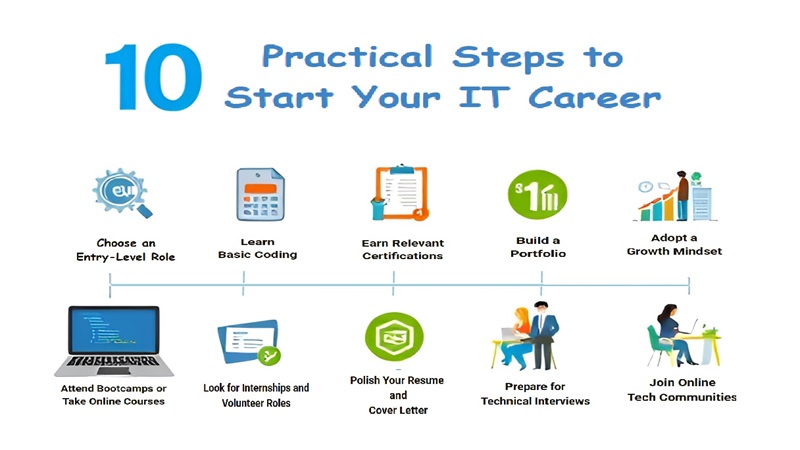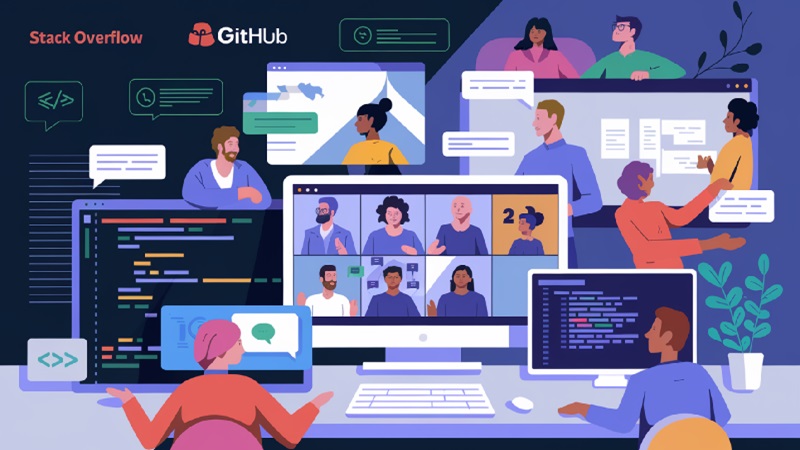How to Start a Career in IT with No Experience - 10 Practical Steps for 2025

In 2025, opportunities to start a career in IT are more accessible than ever.
The continuous growth of the tech industry, the increasing number of online courses, and the rising demand for specialists make this field one of the most welcoming for beginners.
Whether you want to become a programmer, cybersecurity specialist, data analyst, or cloud computing expert, there are clear resources and strategies that can help you build a solid path in IT, even if you have no prior experience.
To ease your transition into technology, here are 10 practical steps that will guide you through the learning and hiring process, providing you with a concrete plan to kickstart your successful career in this dynamic field.
Why IT is an Ideal Field for Beginners
1. Consistent Demand for Technical Skills
The IT industry is evolving rapidly, with emerging technologies such as artificial intelligence (AI), cloud computing, and cybersecurity fundamentally reshaping the way companies operate.
This ongoing transformation is driving a constant demand for specialists, including entry-level positions.
📌 Why is it an advantage for beginners?
- Lack of Specialists Creates Opportunities
The job market is facing a major talent shortage in IT.
According to a 2023 LinkedIn report, tech positions are among the hardest to fill, which means employers are increasingly open to giving opportunities even to those without prior experience.
- New Technologies Require Adaptability, Not Just Experience
Many technological innovations are relatively new, meaning that even experienced specialists are still learning them.
This levels the playing field for juniors, who can acquire knowledge of emerging technologies at almost the same pace as senior professionals.
- Companies Invest in Training and Certifications
Many IT companies provide training programs for new hires, helping them specialize quickly.
For example, Google and Microsoft have launched accessible certification programs specifically designed for beginners, making it easier to gain industry-recognized skills.
- Freelancing and Remote Jobs for Juniors
In IT, traditional office experience is not a strict requirement.
Platforms like Upwork and Fiverr allow juniors to take on small projects, build their portfolios, and gain valuable hands-on experience at an accelerated pace.

🔍 Relevant Statistical Data:
- According to the U.S. Bureau of Labor Statistics, IT jobs are projected to grow by 15% by 2031, significantly outpacing the average growth rate of other industries.
- A 2023 study by CompTIA reveals that over 30% of IT professionals started their careers without a strong technical background, relying on courses and certifications to build their expertise.
2. Attractive Salaries Right from the Start
One of the biggest advantages of a career in IT is the generous salary package, even for entry-level positions.
Unlike other industries, where beginners need to accumulate years of experience to earn a competitive salary, the IT sector offers a much faster progression.

📌 Why Does the IT Industry Offer Attractive Salaries for Juniors?
- High Demand for Specialists Leads to Higher Salaries – The labor shortage in the technology sector forces companies to offer competitive salaries, even for candidates with limited experience.
- Certifications Can Rapidly Boost Earnings – A simple course or certification can significantly impact your salary. For example, a junior professional with a CompTIA A+ or AWS Cloud Practitioner certification can earn 10-20% more than a colleague without certification.
- IT is a Globalized Field – Many companies offer remote opportunities, allowing employees to work for firms in the US or Western Europe, where salaries are considerably higher than in other regions.
- Bonuses and Benefits – In addition to salary, IT specialists often receive performance bonuses, company stock options, project bonuses, and free training programs.
🔍 Relevant Statistical Data:
- According to Glassdoor, the average annual salary for a Junior Software Developer in the USA is approximately $75,000, while in Europe it ranges from €35,000 to €50,000, depending on the country.
- A report by the Stack Overflow Developer Survey 2024 shows that over 60% of junior IT professionals earn more than employees in other industries with 3-5 years of experience.
- In Romania, according to paylab.ro, a junior front-end developer earns an average of between €1,000 and €1,750 net per month, while a junior data analyst earns between €1,300 and €2,000 net per month.

3. Flexibility and Remote Work Opportunities
Another major advantage of a career in IT is the high flexibility, both in terms of work schedule and location.
Compared to other fields, IT offers more options for remote work, flexible hours, or even choosing projects on a freelancing basis.
📌 Why IT Offers So Much Flexibility?
- The Possibility of Remote Work – IT is one of the most remote-friendly industries. Roles such as software developer, data analyst, or cybersecurity specialist allow employees to work from anywhere, as long as they have a stable internet connection.
- Flexible Schedule – Many IT companies adopt results-based work policies, rather than focusing on the number of hours spent at the office. This allows employees to manage their time more effectively and maintain a better work-life balance.
- Freelancing Opportunities – Beginners who want to build a portfolio can start by taking freelance projects on platforms like Upwork, Fiverr, or Toptal, where they can work at their own pace and set their own rates.
- International Mobility – IT is a globalized field, and many companies offer international remote jobs. This means an IT specialist in Romania can work for a company in the USA, UK, or Germany, with access to more competitive salaries.
🔍 Relevant Statistical Data:
- According to a study conducted by FlexJobs in 2023, approximately 75% of IT employees have the opportunity to work remotely at least part-time, and 35% work fully remote.
- A report from LinkedIn Workforce Trends shows that IT roles are among the most sought-after for remote work, with a 25% increase in remote job postings in 2023 compared to the previous year.
- In a survey by Buffer, 97% of IT professionals working remotely stated that they wish to continue this work style due to the flexibility and work-life balance it offers.

10 Practical Steps to Start a Career in IT
Step 1: Choose an Entry-Level Role
One of the most important steps when starting a career in IT is choosing an entry-level role.
These positions are essential for gaining hands-on experience and building a solid portfolio. Here are some ideal options for beginners:
- IT Support Specialist – This is a key role that involves assisting users in resolving technical issues related to hardware, software, and networks. It is an entry-level position where you can learn a great deal about how the IT infrastructure of an organization functions.
- QA Tester – Software testing is another highly accessible field in IT. In this role, you will check the functionality and performance of applications to identify potential bugs. This type of position is suitable for those who are detail-oriented and want to understand how applications are developed.
- Technical Support – This role involves direct interaction with users to resolve various technical issues while also learning about the management of equipment and software used within an organization.
- Junior System Administrator – This role entails managing and maintaining the IT systems of a company, such as servers and networks. While technical knowledge is required, this position is accessible for beginners who have completed relevant courses or obtained certifications.
Choosing an entry-level role will depend on your interests, but it is essential to focus on learning and gaining experience in the chosen field.
Step 2: Learn Basic Programming Languages
An essential step in developing a career in IT is learning the fundamental programming languages.
Getting started with programming may seem challenging, but choosing the right languages makes the process more accessible and enjoyable.
Two of the best candidates for beginners are Python and JavaScript.
- Python: It is an easy-to-learn programming language due to its clear and simple syntax. Python is widely used in web application development, data analysis, artificial intelligence, and task automation. Python courses are accessible, and there is a large community of developers offering support.
- JavaScript: It is essential for web development, being the primary language for interactivity on web pages. JavaScript is used both in the client-side (frontend) and in the backend, alongside platforms like Node.js. Due to its versatility, learning JavaScript will allow you to work on web projects and complex applications.
Start with free or paid online resources, video tutorials, and interactive learning platforms.
Additionally, participating in online programming communities can accelerate the learning process.
Choose simple projects and apply what you’ve learned to strengthen your skills

Step 3: Obtain relevant certifications
Certifications represent an important step in the process of strengthening your knowledge and skills in IT.
They validate your technical abilities and make you more attractive to employers, demonstrating that you possess a globally recognized level of expertise.
Furthermore, obtaining a certification can help you specialize in a specific area of IT.
Two of the most relevant certifications for beginners are:
This is an accessible and highly valuable program for those looking to start a career in IT.
It covers essential topics such as computer networks, hardware and software support, and IT security.
The certification is widely recognized and is ideal for those who want to work in technical support, IT administration, or technical assistance.
It is one of the most well-known certifications in the IT field, designed for those who want to work in system and network administration.
The CompTIA A+ certification covers a wide range of knowledge, from hardware and software management to troubleshooting network and security issues.
It is also a highly sought-after certificate by employers, holding significant value on your resume.
Obtaining this certification not only enhances your CV but also provides a solid foundation of knowledge that will help you in future IT roles.
Additionally, many of these certifications are available online, meaning you can obtain them at your own pace.

Step 4: Build a Portfolio
A well-structured portfolio is an essential element that will open doors in your IT career.
It represents a collection of your best projects and a tangible proof of your skills.
Whether you’re a software developer, a network specialist, or a cybersecurity expert, a solid portfolio will demonstrate to employers that you have the knowledge and experience necessary to excel in your chosen field.
How to build an effective portfolio?
- Choose Relevant Projects: Select projects that demonstrate your ability to solve real-world problems. If you’re a developer, include applications or websites you’ve built. If you’re in cybersecurity, showcase examples of vulnerabilities you’ve identified and the solutions you’ve proposed.
- Personal and Open-Source Projects: Contributing to open-source projects is an excellent way to show your involvement in the IT community and demonstrate your ability to work as part of a team. Personal projects also give you the freedom to explore areas that you are passionate about.
- Be Clear and Organized: The structure of your portfolio should be clear and easy to navigate. Include a brief description of each project, the technologies used, and the problems you solved. You can also add links to the source code (e.g., on GitHub) or demos of your projects.
- Document Your Skills: Your portfolio shouldn’t only focus on your projects but also on the skills and knowledge you’ve gained. Mention the technologies, programming languages, and tools you’re proficient in. Additionally, if you have certifications, include them to add more value to your portfolio.
- Keep It Updated: A successful portfolio is one that evolves constantly. Make sure to add new projects and continuously improve your skills. You can also request feedback from mentors or colleagues to enhance it further.
A well-crafted portfolio not only showcases your skills but also allows you to stand out to employers and secure valuable career opportunities.
Step 5: Join online IT communities
One of the most effective ways to learn quickly and connect with other IT professionals is by joining online communities.
These platforms provide the opportunity to learn from experts, ask questions, and share your experiences.
Here are some popular platforms and the benefits of actively participating in online communities:
- Stack Overflow: One of the largest platforms for IT-related questions and answers. Here, you can search for solutions to programming errors, ask for help with specific issues, and contribute by answering others’ questions, helping you develop both your skills and confidence.
- GitHub: GitHub is not just for storing and sharing code but also for collaborating with other developers. You can contribute to open-source projects, follow interesting repositories, and learn from the code written by experienced developers.
- Reddit - r/learnprogramming: This community is a great place for beginners. You can discuss programming challenges, get recommendations for learning resources, and read about others’ experiences in the field.
- Discord & Slack: Many IT communities have Discord servers or Slack groups where developers of all levels can discuss industry trends, share valuable resources, and even organize live coding sessions.
The Benefits of Joining Online IT Communities
- Knowledge Sharing: By actively participating, you can quickly learn from others’ experiences and improve your programming skills.
- Networking: You can connect with professionals in the field, opening doors to career opportunities and future collaborations.
- Continuous Support: If you encounter difficulties, you’ll always find someone willing to help, which can accelerate your learning process.
- Confidence and Motivation: You’ll be motivated to keep learning and improving your skills, thanks to the positive atmosphere and support from the community.
By joining these communities, you will not only learn faster, but you will also build valuable professional relationships that will support you throughout your IT career.
Step 6: Participate in Bootcamps or Online Courses
An effective method for learning quickly and in a structured way is participating in bootcamps or online courses.
These programs are designed to provide both theoretical knowledge and hands-on experience in a relatively short period of time.
Why choose a bootcamp or an online course?
- Accelerated Learning: Bootcamps are intensive programs designed to help you quickly grasp fundamental concepts and apply them in hands-on projects.
- Accessibility: Platforms like Coursera, Udemy, edX, Codecademy, freeCodeCamp, and Pluralsight offer courses for all levels, from beginners to advanced. Many of these are free or cost significantly less than formal education.
- Flexibility: You can learn at your own pace, choosing hours that fit your schedule. This is an ideal option for those who work or study simultaneously.
- Recognized Certifications: Many of these platforms offer certificates that can be added to your resume or LinkedIn profile, increasing your chances of employment.
- Hands-on Projects: Most bootcamps and courses include practical projects, allowing you to build a demonstrable portfolio.

How to Choose the Best Course or Bootcamp?
- Think About Your Desired Specialization – If you want to become a web developer, choose a bootcamp focused on HTML, CSS, JavaScript, and React. If you’re interested in data science, a course in Python, SQL, and machine learning might be ideal.
- Check Reviews and Recommendations – Look for opinions from those who have already completed the course or bootcamp.
- Evaluate the Curriculum – Ensure it covers relevant topics and provides practical exercises.
- Compare Prices – Some bootcamps may be expensive, but there are also more affordable or even free alternatives available.
A bootcamp or an online course not only provides you with technical knowledge, but also opens doors to networking opportunities, mentorship, and access to communities of industry professionals.
If you’re aiming for a quick transition into an IT job, this can be one of the most effective learning methods.

Step 7: Search for Internships or Volunteer Opportunities
After gaining theoretical knowledge and working on personal projects, the next essential step is to gain practical experience through internships or volunteer activities.
These opportunities will help you better understand how the IT industry works, collaborate with professionals, and build a stronger portfolio
Why Internships and Volunteering Are Important?
- Real-World Practical Experience – You will work on real projects, learn best practices, and acquire relevant skills.
- Networking – You will have the opportunity to interact with industry professionals, potentially opening doors to future job opportunities.
- Understanding Work Processes – You will see how IT teams operate and learn methodologies like Agile or Scrum.
- Increased Employment Chances – Employers value candidates who already have practical experience, even if it was gained through an internship.
How to Find an Internship or Volunteer Opportunity?
- Apply on Specialized Websites – Platforms like LinkedIn, Glassdoor, Internshala, or company websites frequently offer internships for beginners.
- Participate in Hackathons and IT Events – These are excellent places to interact with employers and showcase your skills.
- Join IT Volunteer Programs – Non-profit organizations and startups often seek volunteers for web development, software testing, or system administration.
- Networking and Recommendations – Engage with mentors, professors, or industry professionals. Sometimes, the best opportunities come through recommendations.
Try to secure at least one internship or volunteer project before applying for a full-time job.
This will not only enhance your resume but will also provide you with a clear perspective on the direction you want to take in developing your career.

Step 8: Refine Your Resume and Cover Letter
Once you have acquired the necessary knowledge and completed a few practical projects, it is essential to create a professional resume and a well-crafted cover letter.
These documents are the first elements that recruiters will review, so it’s important to clearly highlight your skills, experience, and certifications.
How to Build a Strong CV for IT
- Add a professional profile section – A concise summary of 2-3 sentences that highlights who you are, your skills, and your professional goals.
- Highlight technical skills – List programming languages, frameworks, databases, and other technologies you are familiar with. Use categories to organize the information better (e.g., Frontend, Backend, DevOps, Security).
- Include relevant projects – If you lack professional experience, personal projects or those completed during online courses are extremely valuable. Add links to your GitHub or online portfolio.
- Add certifications – IT certifications can make a difference in the eyes of employers. For example, mention certifications like CompTIA A+, AWS Certified Cloud Practitioner, Cisco CCNA, or others relevant to your chosen field.
- Mention education and relevant courses – If you have a degree in IT or have taken online courses on platforms like Udemy, edX, or Google Career Certificates, make sure to specify these details.
- Optimize your CV for ATS systems – Use industry-specific keywords, as many companies use automated systems (Applicant Tracking Systems) to filter resumes.
How to Write a Compelling Cover Letter
- Personalize your cover letter for each job you apply to.
- Explain why you are interested in that position and how your skills align with the job requirements.
- Provide concrete examples of relevant projects or experience you have.
- Maintain a professional and enthusiastic tone, but avoid clichés.
A well-structured resume and a personalized cover letter will increase your chances of securing an interview and making an excellent first impression with employers.

Step 9: Prepare for Technical Interviews
Preparing for technical interviews is a crucial step in the process of securing an IT job.
Most employers in the field will assess not only your theoretical knowledge but also your practical skills, so it is important to prepare thoroughly.
How to Prepare:
- Practice Common Technical Questions
Technical interviews typically include questions about fundamental programming concepts, data structures, and algorithms.
It’s essential to master these topics, and an effective way to prepare is by practicing frequently asked questions.
Here are a few examples of common questions:
- “How do you implement a doubly linked list?”
- “Explain the difference between a selection sort algorithm and a bubble sort algorithm.”
- “How do you solve the parentheses balancing problem in a string?”
- Use Online Training Platforms
Platforms like LeetCode, HackerRank, or CodeSignal are excellent for testing and improving your programming skills.
These websites offer a wide range of problems with varying difficulty levels, reflecting real interview questions.
By practicing these exercises, you will learn how to approach logic and algorithmic problems under time pressure.
- Solve Practical Scenarios
In addition to theoretical questions, many technical interviews include practical scenarios where you need to solve a programming problem in real-time.
These may involve writing functions to solve a data problem or creating an algorithm to optimize a process.
Practice such scenarios and focus on critical thinking and troubleshooting techniques.
- Review Your Projects
Before the interview, make sure you can confidently discuss your previous projects.
Be prepared to explain the solutions you implemented and to answer questions about the challenges you faced.
Employers will be impressed by your ability to solve problems clearly and efficiently.
- Simulate Interviews with Friends or Mentors
Another excellent preparation method is simulating interviews.
You can ask a friend or a mentor in the field to ask you technical questions and observe how you approach solving them.
This exercise will help you improve your response time and get accustomed to the interview atmosphere.
Preparing for technical interviews can be challenging, but with a structured approach and plenty of practice, you will be able to present yourself confidently and land the desired role in IT

Step 10: Adopt a mindset of continuous learning
In the IT field, technological changes are rapid and constant.
Therefore, adopting a mindset of continuous learning is essential for long-term success.
Technologies are evolving at a fast pace, and those who fail to adapt risk falling behind.
Here’s how you can implement this step in your career:
- Stay up to date with the latest trends – Follow specialized IT blogs, podcasts, and YouTube channels to stay informed about the newest developments. Platforms such as TechCrunch, Wired, and GitHub are excellent sources of information.
- Participate in continuous training courses – After obtaining your foundational certifications, continue learning through advanced courses in areas such as cybersecurity, cloud computing, or machine learning. Many online platforms (Coursera, edX, Udemy) offer relevant courses for each IT field.
- Experiment with personal projects – Apply what you’ve learned by creating personal applications or participating in hackathons and coding competitions. These experiences will help you familiarize yourself with new technologies and improve your skills.
- Seek feedback – Be open to feedback from colleagues or mentors. Learning from others’ mistakes and achievements is an effective way to accelerate your learning process.
- Join technical communities – Engage in online forums or professional groups on platforms like LinkedIn, Stack Overflow, Reddit, or GitHub. Here, you can ask questions, share knowledge, and learn from other professionals in the field.
In the end, the key to success in IT is not just the accumulation of knowledge, but also the ability to adapt to technological changes.
A mindset of continuous learning will help you stay competitive and advance in your career, regardless of the challenges that may arise.

REMEMBER!
A career in IT without formal experience is absolutely achievable. By following these steps and being persistent, you can secure exciting opportunities in the field.




